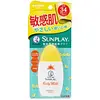What's inside
What's inside
 Key Ingredients
Key Ingredients

 Benefits
Benefits

 Concerns
Concerns

No concerns
 Ingredients Side-by-side
Ingredients Side-by-side

Cyclopentasiloxane
EmollientWater
Skin ConditioningDimethicone
EmollientZinc Oxide
Cosmetic ColorantGlycerin
HumectantPPG-10 Methyl Glucose Ether
Skin ConditioningTitanium Dioxide
Cosmetic ColorantPolymethylsilsesquioxane
Trimethylsiloxysilicate
Emollient1,2-Hexanediol
Skin ConditioningPCA Dimethicone
Skin ConditioningSodium Hyaluronate
HumectantDipotassium Glycyrrhizate
HumectantMagnesium Ascorbyl Phosphate
AntioxidantTocopheryl Acetate
AntioxidantHydrated Silica
AbrasivePolyglyceryl-3 Polydimethylsiloxyethyl Dimethicone
Skin ConditioningHydrogen Dimethicone
Aluminum Hydroxide
EmollientPanthenol
Skin ConditioningDimethicone/Vinyl Dimethicone Crosspolymer
Skin ConditioningCyclopentasiloxane, Water, Dimethicone, Zinc Oxide, Glycerin, PPG-10 Methyl Glucose Ether, Titanium Dioxide, Polymethylsilsesquioxane, Trimethylsiloxysilicate, 1,2-Hexanediol, PCA Dimethicone, Sodium Hyaluronate, Dipotassium Glycyrrhizate, Magnesium Ascorbyl Phosphate, Tocopheryl Acetate, Hydrated Silica, Polyglyceryl-3 Polydimethylsiloxyethyl Dimethicone, Hydrogen Dimethicone, Aluminum Hydroxide, Panthenol, Dimethicone/Vinyl Dimethicone Crosspolymer
Water
Skin ConditioningAlcohol Denat.
AntimicrobialEthylhexyl Methoxycinnamate
UV AbsorberZinc Oxide
Cosmetic ColorantIsopropyl Palmitate
EmollientSilica
AbrasiveButylene Glycol
HumectantEthylhexyl Triazone
UV AbsorberDiethylamino Hydroxybenzoyl Hexyl Benzoate
UV FilterIsononyl Isononanoate
EmollientDipentaerythrityl Tri-Polyhydroxystearate
EmollientTriethoxycaprylylsilane
Bis-Ethylhexyloxyphenol Methoxyphenyl Triazine
Skin ConditioningSorbitan Stearate
EmulsifyingHydroxyethyl Acrylate/Sodium Acryloyldimethyl Taurate Copolymer
Emulsion StabilisingSodium Acrylate/Sodium Acryloyldimethyl Taurate Copolymer
Emulsion StabilisingIsohexadecane
EmollientPolysorbate 80
EmulsifyingPolysilicone-9
Royal Jelly Extract
Skin ConditioningSodium Hyaluronate
HumectantDisodium EDTA
BHT
AntioxidantParfum
MaskingWater, Alcohol Denat., Ethylhexyl Methoxycinnamate, Zinc Oxide, Isopropyl Palmitate, Silica, Butylene Glycol, Ethylhexyl Triazone, Diethylamino Hydroxybenzoyl Hexyl Benzoate, Isononyl Isononanoate, Dipentaerythrityl Tri-Polyhydroxystearate, Triethoxycaprylylsilane, Bis-Ethylhexyloxyphenol Methoxyphenyl Triazine, Sorbitan Stearate, Hydroxyethyl Acrylate/Sodium Acryloyldimethyl Taurate Copolymer, Sodium Acrylate/Sodium Acryloyldimethyl Taurate Copolymer, Isohexadecane, Polysorbate 80, Polysilicone-9, Royal Jelly Extract, Sodium Hyaluronate, Disodium EDTA, BHT, Parfum
 Reviews
Reviews

Ingredients Explained
These ingredients are found in both products.
Ingredients higher up in an ingredient list are typically present in a larger amount.
Sodium Hyaluronate is hyaluronic acid's salt form. It is commonly derived from the sodium salt of hyaluronic acid.
Like hyaluronic acid, it is great at holding water and acts as a humectant. This makes it a great skin hydrating ingredient.
Sodium Hyaluronate is naturally occurring in our bodies and is mostly found in eye fluid and joints.
These are some other common types of Hyaluronic Acid:
Learn more about Sodium HyaluronateWater. It's the most common cosmetic ingredient of all. You'll usually see it at the top of ingredient lists, meaning that it makes up the largest part of the product.
So why is it so popular? Water most often acts as a solvent - this means that it helps dissolve other ingredients into the formulation.
You'll also recognize water as that liquid we all need to stay alive. If you see this, drink a glass of water. Stay hydrated!
Learn more about WaterZinc Oxide is a mineral broad-spectrum UV filter; it is the broadest UVA and UVB reflector approved by the FDA. It also has skin protectant and skin soothing properties.
Zinc oxide is one of the most effective broad-spectrum UV filters. It protects against UVB, UVAII, and UVAI. In comparison to its counterpart titanium dioxide, zinc oxide provides uniform and extended UVA protection.
Another great benefit? This ingredient is highly photostable so it won't degrade easily under sunlight.
A common myth is that mineral UV filters are widely believed to primarily reflect UV light.
However, modern research shows titanium dioxide absorbs UV radiation like chemical filters (~95% absorption & 5% reflection).
Zinc oxide has great skin soothing properties so you'll likely find this in sunscreens formulated for sensitive skin or babies/children. It is unlikely to cause "eye sting" like other sunscreen ingredients.
Regulatory agencies consider zinc oxide to be non-toxic and safe. It has also been shown to not penetrate the skin.
Unfortunately, this ingredient does leave a visible white cast. This is why mineral sunscreens are often less cosmetically elegant than chemical or hybrid ones.
In cosmetics, zinc oxide can be found in both non-nano and nano-sized forms. The nano version is used to reduce white cast and improve the texture of sunscreen formulas.
There are ongoing concerns surrounding nano-zinc oxide's impact on marine ecosystems and whether it can be absorbed into skin.
Regarding marine ecosystems and coral reefs, there is no conclusive evidence that any form of zinc oxide (or any other sunscreen ingredients) will cause harm. The science is still developing but many consumers are keeping a close eye on this issue.
Please note, many destinations have reef-safety sunscreen rules. For instance, the U.S. Virgin Islands advises all visitors to use non-nano mineral sunscreens.
There has also been some stir about whether micronized or nano zinc oxide has potential photoxicity and absorption through the skin/lungs.
An in-vitro (done in a test tube or petri dish) study demonstrated micronized zinc oxide to have potential phototoxicity. There's no need to fret; the EU Commission's Scientific Committee on Consumer Safety has stated, "The relevance of these findings needs to be clarified by appropriate investigations in vivo." Or in other words, further studies done on living organisms are needed to prove this.
Current research shows zinc oxide nanoparticles do not penetrate intact or sunburned skin. They either remain on the surface or in the outermost layer of dead skin (stratum corneum).
Zinc oxide is one of only two classified mineral UV filters with titanium dioxide being the other one.
Fun fact: Zinc has been used throughout history as an ingredient in paint and medicine. An Indian text from 500BC is believed to list zinc oxide as a salve for open wound. The Ancient Greek physician Dioscorides has also mentioned the use of zinc as an ointment in 1AD.
Learn more about Zinc Oxide